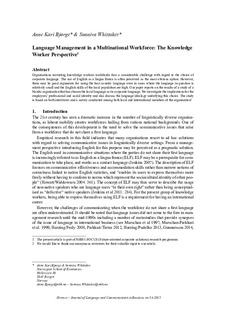| dc.contributor.author | Bjørge, Anne Kari | |
| dc.contributor.author | Whittaker, Sunniva | |
| dc.date.accessioned | 2016-02-26T11:45:33Z | |
| dc.date.accessioned | 2017-11-09T09:16:07Z | |
| dc.date.available | 2016-02-26T11:45:33Z | |
| dc.date.available | 2017-11-09T09:16:07Z | |
| dc.date.issued | 2015 | |
| dc.identifier.citation | Hermes - Journal of Language and Communication Studies 2015(54):137-160 | nb_NO |
| dc.identifier.issn | 0904-1699 | |
| dc.identifier.uri | http://hdl.handle.net/11250/2465114 | |
| dc.description | With permission from publisher, Aarhus University. All rights reserved. | nb_NO |
| dc.description.abstract | Organisations recruiting knowledge workers worldwide face a considerable challenge with regard to the choice of
corporate language. The use of English as a lingua franca is often perceived as the most obvious option. However,
there may be good arguments for using the host country language even in cases where the language in question is
relatively small and the English skills of the local population are high. Our paper reports on the results of a study of a
Nordic organisation that has chosen the local language as its corporate language. We investigate the implications for the
employees’ professional and social identity and also discuss the language ideology underlying this choice. The study
is based on both interviews and a survey conducted among both local and international members of the organisation2 | nb_NO |
| dc.language.iso | eng | nb_NO |
| dc.title | Language management in a multinational workforce: The knowledge worker perspective. | nb_NO |
| dc.type | Journal article | nb_NO |
| dc.date.updated | 2016-02-26T11:45:33Z | |
| dc.source.pagenumber | 137-160 | nb_NO |
| dc.source.volume | 2015 | nb_NO |
| dc.source.journal | Hermes - Journal of Language and Communication Studies | nb_NO |
| dc.source.issue | 54 | nb_NO |
| dc.identifier.cristin | 1319543 | |
